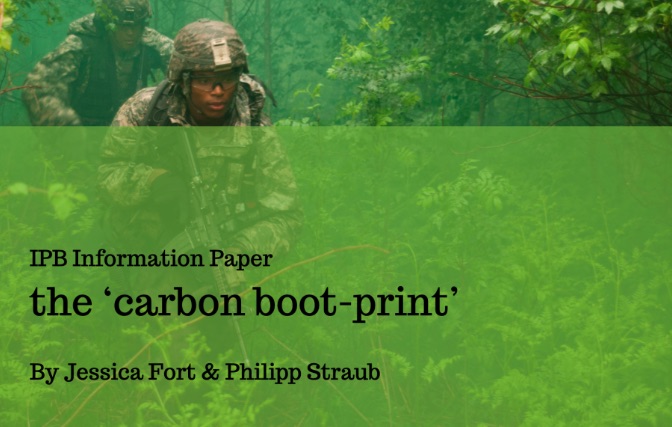. . SUSTAINABLE DEVELOPMENT . .
An information paper by Jessica Fort and Philipp Straub from the International Peace Bureau and a press release from the IPB
The US military is not only the most funded army in the world, it is also “one of the largest polluters in history, consuming more liquid fuels and emitting more climate-changing gases than most medium-sized countries”. The Department of Defence’s daily consumption alone is greater than the total national consumption of countries like Sweden, Switzerland or Chile. And the US has been continuously at war, or engaged in military actions, since late 2001.

War and militarism, and their associated ‘carbon boot-prints’, are severely accelerating climate change. However, the military’s significant contribution to climate change has still received little attention. It is not only the US army that has a severe impact on climate change, Europe’s military is also running its bases and its various operations and contributing to the rise in carbon emissions. However, obtaining accurate data about any form of military energy consumption is very difficult.
(continued in right column)
What is the relation between the environment and peace
(continued from left column)
The entire IPB Information Paper by Jessica Fort and Philipp Straub is available here: IPB Information Paper – the carbon boot-print
IPB stresses the COP25 to include the military in its climate action work and to adopt provisions covering military compliance. The COP25 must include military emissions in their calculations and the CO2 emissions laundering has to stop. It should also include a blueprint to reduce military emissions.
IPB urges the State Parties to the Paris Agreement to adjust its provision to military emissions, not leaving decisions up to nation states as to which national sectors should make emissions cuts.
IPB calls for an inclusion of military greenhouse gas emission into climate change regulations. Moreover, countries need to be obliged, without exemption, to cut military emissions and transparently report them.
IPB calls for more academic studies (in line with the study from Brown University report) and an IPCC or equal special report. The report needs to be a common project of academics and the civil society. [Crawford N (2019). Pentagon Fuel Use, Climate Change, and the Costs of War. Brown University, USA ]